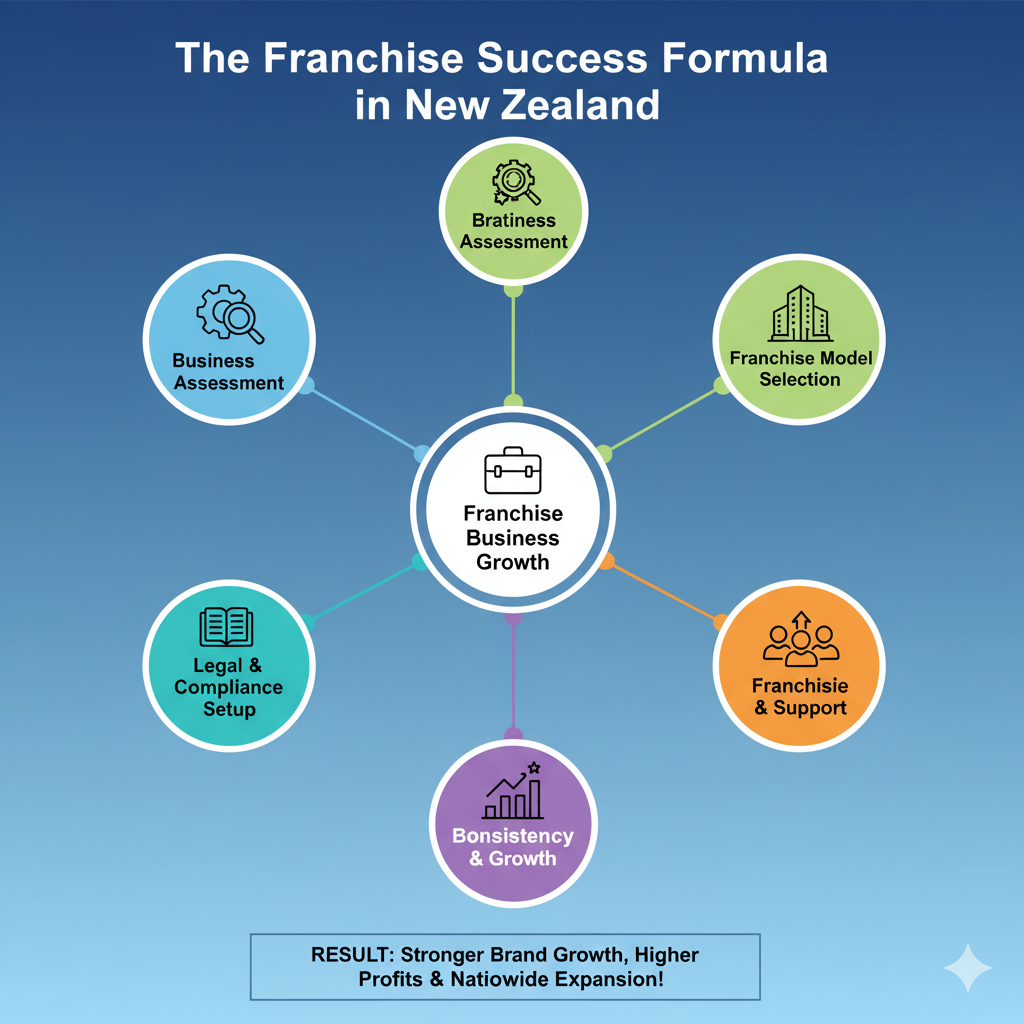How to open a Franchise in New Zealand
Franchising is one of the best ways to grow your business in New Zealand’s many different markets. Franchises can grow well in this country because the economy is stable, the business climate is friendly, and there are more and more customers. If you own a successful café in Auckland or a busy service business in Wellington, franchising can help you spread your success across the country while lowering the risks that come with rapid growth.
Many successful New Zealand businesses have grown in a unique way through franchising. They can use other people’s money and knowledge of the local market while still being in charge of brand standards and operations. Franchising isn’t just about letting someone else use your business name, though. It takes a lot of planning, following the law, and a promise to help your franchisees do well.
This full guide will show you how to franchise your business in New Zealand, from the first evaluation to the ongoing management of the franchise. You’ll learn about the laws that apply to franchises, the different types of franchises, and how to set up a franchise system that works for you and your franchisees.
This guide gives you the useful information you need to make smart decisions about your franchise journey, whether you’re just starting to think about franchising or want to improve the way you’re doing things now.
Looking at Your Business to See if It’s Ready to Franchise
Before you start the franchising process, you need to be honest with yourself about whether your business is really ready to grow through franchising. Not every business that does well is a good chance to start a franchise.
Basic Rules of Business
Your business needs to be able to make money at more than one location on a regular basis, or it needs to have a proven track record of success that others can follow. Franchisees invest their time and money in your business model because it has worked before. For at least two to three years, keep track of where your money comes from, how much you make, and your key performance indicators.
Companies that are ready to become franchises have the same systems and processes for everyone. Could you write down a step-by-step guide on how your business works? Do you always treat customers the same way? Your business model should be easy for other people to understand and use, but hard enough to keep competitors from getting in.
Brand Awareness and Market Position
If people in your target market know your brand well, your franchise will be much more appealing. People who want to open a franchise are more likely to invest in a business that already has a lot of customers and is well-known in the market. But don’t let not being well-known stop you. Many successful franchises started out with a good name in their own area and then spread to the whole country.
Operations that are organized and can grow
Make sure your business can keep up its quality and consistency as it grows. It’s often easier for service-based businesses to franchise than for manufacturing businesses because service businesses use standard processes instead of complicated supply chains. Consider how you’ll check the quality at different places and with different operators.
Your business should also have ways to keep track of its finances, manage its inventory, train its employees, and keep track of its customer relationships. Your franchise operations manual is built on these systems.
Knowing about New Zealand’s franchise laws
There is a specific set of laws in New Zealand that govern franchising. These laws are meant to protect both franchisors and franchisees and encourage fair business practices.
The Fair Trading Act and the Rules for Disclosure
The Fair Trading Act 1986 in New Zealand makes it illegal for businesses to act in a way that is misleading or deceptive. As a franchisor, you have to give accurate information about how your business is doing, such as financial statements and realistic estimates of how much money it will make.
You must tell potential franchisees about all important facts that could affect their decision. This includes any lawsuits, past failures of franchisees, changes in the company’s ownership, and full details about ongoing fees and obligations.
FANZ, or the Franchise Association of New Zealand
Joining the Franchise Association of New Zealand shows that you are committed to doing business ethically, even though membership is not required. FANZ can help you make your franchise system stronger by giving you access to useful tools, industry standards, and chances to network.
Members of FANZ agree to follow the Code of Ethics and Code of Practice, which set the lowest standards for how franchises should work together. These codes talk about how to handle relationships, how to settle disputes, and how to make sure that information is shared.
Protecting Your Intellectual Property
Before you start franchising, make sure your business names, trademarks, and proprietary systems are safe. To stop people from using your trademarks without permission and to make sure that your brand is used the same way at all of your franchise locations, register them with the Intellectual Property Office of New Zealand (IPONZ).
Think about keeping your operations manual, training materials, and unique business processes secret. To keep control over these valuable assets, make sure your franchise agreements have detailed intellectual property clauses.
Picking the Right Structure for Your Franchise
Different types of franchises work better for different kinds of businesses and growth goals. Knowing your options helps you choose the best structure for your situation.
Franchising in a Business Format
This all-encompassing method gives franchisees everything they need to run your business, from operating procedures and marketing plans to supplier relationships and ongoing support systems. Business format franchising is a good fit for retail stores, restaurants, and service businesses that want to give all of their customers the same experience.
In exchange for higher franchise fees and royalty payments, franchisees get a lot of training and help all the time. This model needs a lot of money to build systems, but it usually makes more money.
Franchising for Product Distribution
This model is easier than business format franchising because it focuses on getting your products into the hands of independent retailers. Franchisees get marketing help and established relationships with suppliers, but they also have more freedom in how they run their businesses.
This method works well for businesses that sell one-of-a-kind products that can be sold in a variety of retail settings. It needs less training and support, but it usually makes less money over time.
Master Franchise Agreements
Master franchise agreements let experienced operators set up franchise systems in certain areas for larger territories or specialized markets. Master franchisees are in charge of hiring, training, and helping people in their area, and they pay fees based on how well their area does overall.
This model speeds up growth while lowering your direct management duties. But it needs careful selection of master franchisees and clear standards for performance.
Making Your Franchise Agreement
Your franchise agreement is the legal basis for each franchise relationship. It spells out what each party’s rights, duties, and expectations are.
Important Parts of an Agreement
Territory Rights: Make sure that each franchisee’s territory is clearly defined, including population-based or geographic limits. Say whether territories are exclusive and when they might be changed.
Fees and Royalties: Set up your fee system so that it strikes a balance between making money for franchisees and meeting your own revenue needs. Initial franchise fees usually pay for training and setup costs, while ongoing royalties pay for system development and support services.
Most franchise agreements last for five to ten years and can be renewed. Include clear criteria for renewing and any changes to the terms that might happen during renewal periods.
Performance Standards: Set clear, measurable standards for customer service, quality control, sales goals, and following the rules of the business. Include ways to deal with poor performance and ways to fire someone for serious violations.
Requirements for Operations
Explain the operational standards that franchisees must follow, such as hours of operation, staffing requirements, inventory standards, and customer service procedures. These rules make sure that customers have the same experience at all locations.
Include rules for regular quality audits and inspections. Franchisees need to know that keeping the system standards is important for the brand’s reputation and the success of all franchisees.
Duties for Marketing and Advertising
Say how the franchisor and franchisee will share marketing duties. Many systems require franchisees to pay into a national advertising fund while still following local marketing rules.
Set rules for how to use the brand, what marketing materials are allowed, and how to make local promotions. Clear marketing standards keep brands strong while still letting them adapt to local markets.

Making a Complete Operations Manual
Your operations manual is the key to your franchise’s success. It records every part of your business in enough detail for others to copy what you do.
Documentation of Operational Procedures
Make sure to write down every important business process, from how to open a store to how to close it. Include scripts for customer service, ways to prepare products, systems for managing inventory, and procedures for running the business.
Use clear, step-by-step directions and pictures when they can help. Your manual should make it easy for someone who doesn’t know your business to understand and use your systems correctly.
Standards for Quality Control
Set quality standards for products, services, and interactions with customers that can be measured. Include checklists for inspections, quality metrics, and steps to take to fix problems.
Regular quality control keeps all franchise locations consistent and protects your brand’s reputation. Clear standards also give you a way to judge how well a franchisee is doing.
Rules for Training
Give an overview of the first training program that all franchisees and important employees must finish. Include both classroom-style learning and hands-on training in the program.
Create training modules that are always available for new products, system updates, and skill development. Franchisees stay up to date on best practices and system improvements by learning all the time.
Updates to the system and communication
Set up ways to let people know about changes to the system, new procedures, and important news. Regular communication keeps all franchisees on the same page with system standards and up to date on new opportunities.
Include ways for franchisees to give feedback so they can share good ideas and suggest ways to make things better with the whole system.
Finding and hiring good franchisees
It’s very important to find the right franchisees for the long-term success of your system. The best franchisees bring money, dedication, and skills that work well with your business model.
Creating the Perfect Franchisee Profile
Based on what your business needs and what has worked well in other systems, make a list of the traits you want in your ideal franchisee. Think about things like how much money you have, how much business experience you have, how committed you are, and how well the person fits with your company’s values.
Some businesses like franchisees who have worked in the industry before, while others like motivated people who can learn your way of doing things. Find out which method works best for your business model.
Getting potential franchisees interested in your business
Make marketing materials that clearly explain the benefits and requirements of your franchise opportunity. Include realistic financial projections, success stories from current franchisees, and detailed information about the support you will get after you open your business.
Go to franchise trade shows, work with franchise brokers, and use digital marketing to find qualified candidates. The goal is to get serious inquiries, not the most inquiries.
Choosing and Checking Process
Use a thorough selection process that looks at a person’s financial ability, personal commitment, and fit with the culture. Ask for detailed financial statements, do background checks, and set up several interviews.
As part of your selection process, have meetings with current franchisees. These talks give both sides useful information and often bring up possible problems early in the evaluation process.
Training and Getting Started
Make a structured training program that covers all parts of running a business, from technical skills to how to treat customers well. Include both training before the business opens and programs for ongoing education.
Give hands-on help during the first few weeks of business. This important time often decides if new franchisees do well at first and keep faith in the system.
Keeping the brand consistent and getting help with marketing
Branding that is the same at all franchise locations helps individual franchisees grow and builds customer trust and success across the system.
Making Brand Standards
Make detailed rules for your brand that cover how to use the logo, how to design the store, what to wear, what signs to put up, and what marketing materials to use. Consistency in how things look helps people remember your brand and what they expect from it.
Include rules for your online presence, such as how to use social media, manage online reviews, and set standards for your website. Customers today interact with brands in a number of ways.
Managing the Marketing Fund
Many franchise systems set up marketing funds that franchisees pay into. These funds pay for advertising campaigns across the country, promotions across the whole system, and the creation of marketing materials.
Be open about how you use your marketing funds and show clear returns on investment. Franchisees are willing to help with marketing costs when they can see how it will help their own businesses.
Help with local marketing
System-wide marketing helps people learn about the brand, but franchisees need help growing their businesses in their own areas. Give local advertising efforts templates, rules, and a list of approved vendors.
Encourage franchisees to take part in community events, work with other businesses in the area, and run targeted promotions that get results right away and help them build long-term relationships with customers.
Putting together digital marketing
Today’s franchisees need all-in-one digital marketing help, such as tools for building websites, improving search engine rankings, and managing social media accounts.
Give systems that let people change things locally while keeping the brand consistent. A lot of successful franchise systems use centralized platforms that let people in different locations make content that fits with the brand’s rules.
Requirements for financial planning and investing
If you know how franchising works financially, you can set up long-term fee agreements that help franchisees succeed.
Cost Analysis for Starting Up
Find out how much money franchisees need to start and run their businesses successfully. Costs for professional services, working capital, equipment, initial inventory, and franchise fees should all be included.
Give realistic deadlines for when the business will become profitable and detailed cash flow projections for the first year of operation. Franchisees can make smart investment choices when they have accurate financial information.
Ongoing Fee Structure
Set up your royalty fees so that they meet your revenue needs and the needs of your franchisees. Depending on how your business works, you might want to use percentage-based royalties, flat fees, or a mix of the two.
Most of the time, contributions to the marketing fund are between 1% and 4% of gross revenue. If there are technology fees, they should show the value of the support and system-wide platforms that are provided.
Help and resources for financing
You shouldn’t give franchisees money directly, but you can help them get loans by working with banks and other lenders who know your franchise system.
Some franchisors help franchisees get credit from suppliers or finance their equipment. These deals can help lower the costs of starting a business while also bringing in more money.
Monitoring performance and keeping an eye on finances
Set up systems to keep an eye on the financial health of your franchisees, such as regular reporting requirements and key performance indicators.
By spotting financial problems early, you can get help and intervene in a timely manner, which often stops businesses from failing and hurting your system’s reputation.
Giving ongoing help and managing the system
Long-term success for a franchise depends on ongoing support, system upgrades, and managing relationships that are good for everyone involved.
Systems for Regular Communication
Set up regular ways for franchisees to talk to each other, like system-wide conference calls, newsletters, annual meetings, and online forums where they can share their experiences and ask questions.
Good communication keeps franchisees up to date on changes in the system, gives them chances to learn, and builds the community relationships that make franchise systems work better.
Quality Assurance and Performance Monitoring
Set up regular evaluation methods like site visits, surveys of customer satisfaction, and reviews of financial performance. Regular monitoring helps find problems early and spot great work.
Use performance data to find ways to make the whole system better and share best practices with everyone.
Changes and new ideas in the system
Franchise systems that work well are always changing to keep up with new market conditions and customer needs. Check and update your operations manual, training programs, and support systems on a regular basis.
Use advisory councils, pilot programs, and feedback sessions to get franchisees involved in the process of coming up with new ideas. Their knowledge of the market often helps them find good ways to improve.
Conflict resolution and managing relationships
Make sure you have clear rules for how to handle disagreements and keep good relationships with your franchisees. A lot of arguments happen because people don’t talk to each other properly, not because they disagree on something important.
Think about using mediation services to settle big disagreements. Keeping good relationships helps your brand’s reputation and the success of the whole system.
Moving Forward in Your Franchise Journey
Franchising your business in New Zealand is a big chance and a big commitment at the same time. To be successful, you need to plan carefully, follow the law, and keep working hard to help your franchisees succeed.
The best franchisors see their systems as partnerships in which everyone works together to achieve success. You can make your business model last by giving franchisees useful help, keeping high standards, and always making your systems better.
Keep in mind that relationships are what franchising is all about. The trust and respect you build with franchisees have a direct effect on how much your system can grow and how long it will last.
First, make sure your business is ready by doing a full assessment. Then, go through the steps of making sure you’re following the law, writing down your systems, and hiring franchisees. Each step lays the groundwork for the next stage of your growth.







